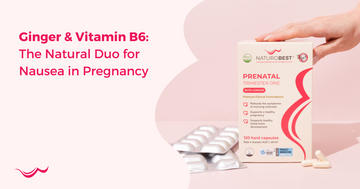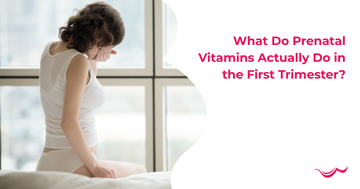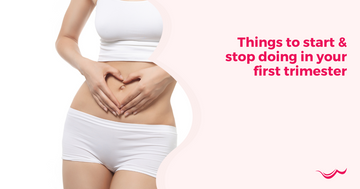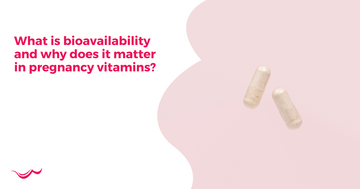Should I take prenatal vitamins after I find out I’m pregnant?
by NaturoBest Naturopath Team on May 02, 2022

You’re pregnant, congratulations! This is such an exciting time, and naturally, you’re probably wondering what you should be taking to support your health and your baby’s development.
There’s a lot of information out there about preconception, prenatal, and pregnancy vitamins, and it can get confusing. Let’s break it down simply.
Understanding the Difference Between Preconception and Prenatal Vitamins
Preconception care focuses on health before pregnancy, for both women and men. Preconception vitamins (or pre-pregnancy vitamins) are designed to prepare the body for conception by building up essential nutrients that help prepare the body for pregnancy and support healthy reproductive hormones.
Prenatal care, on the other hand, begins once you’re pregnant. Prenatal means before birth, and prenatal or pregnancy vitamins provide nutrients that support the growing baby and the mother’s increased nutritional needs.
So, when we talk about prenatal or pregnancy multivitamins, we’re referring to the same thing.
Should I Keep Taking Prenatal Vitamins After Finding Out I’m Pregnant?
Yes, absolutely!
Prenatal vitamins are essential as soon as you find out you’re pregnant, ideally after taking preconception vitamins for three to four months beforehand. These formulations provide key nutrients your body needs in higher amounts during pregnancy to support both your health and your baby’s growth.
If you follow a vegan or vegetarian diet or avoid certain foods, you may need to supplement additional nutrients such as iron, choline, or calcium. It’s also crucial to ensure you’re getting enough folate, especially before week 6, when the neural tube closes and early brain and spine development occur.
My GP told me to take Folic Acid or Folate: What’s the Difference?
Folate is the natural form of vitamin B9 found in foods such as leafy greens, legumes, citrus fruits, and brown rice. There are three main types used in supplements:
- Folic acid – the synthetic form used in many supplements and fortified foods. It needs to be converted by the body into active folate, which can be difficult for people with an MTHFR gene variation.
- Folinic acid – a naturally occurring form that is one step closer to being active.
- Active folate (5-MTHF) – the most bioavailable form, ready for the body to use directly, and ideal for those with MTHFR variations.
Adequate folate reduces the risk of neural tube defects such as spina bifida and anencephaly by more than 50%, and may lower the risk of miscarriage in women with high homocysteine levels.
The World Health Organisation recommends women take 400 mcg of folic acid (or folate) daily for at least two months before conception. For best results, we suggest beginning a quality preconception vitamin about three months before trying to conceive, as part of a complete preconception plan for both partners.
Why Prenatal Vitamins Are Important During Pregnancy
Prenatal or pregnancy multivitamins contain essential nutrients shown to be vital during pregnancy. Along with folate, you should ensure adequate intake of:
- Iodine, which supports normal brain and nervous system development.
- Calcium and magnesium, which assist in bone and muscle health.
- Choline and vitamin D, which support brain development and immune health.
If it feels overwhelming to meet all these needs through food alone, don’t worry, a quality prenatal multivitamin can provide the support you need for a healthy pregnancy.
For more guidance on what to look for in your supplements, see our article: How To Choose the Best Prenatal Vitamin.
Do I Need Iron During Pregnancy?
Iron is an important nutrient, but it can also worsen morning sickness and nausea. That’s why we deliberately leave iron out of our Prenatal trimester one with ginger formula and instead include ginger and vitamin B6 to help ease nausea.
Your body’s need for iron increases during the second and third trimesters, as blood volume doubles from around week 16 onwards to carry oxygen to your baby. We have specially formulated Prenatal Trimester 2 & 3 to include iron in a well-tolerated and well absorbed form to support increased blood volume experience during this time.
If you experience morning sickness, we recommend waiting until the second trimester to introduce iron-containing supplements, helping to avoid aggravating nausea in early pregnancy.
Final Thought
Supporting your body with the right nutrients is one of the best ways to care for yourself and your baby. By choosing a quality preconception or prenatal vitamin, eating nourishing foods, and working closely with your healthcare practitioner, you can feel confident you’re giving your baby the healthiest start possible.
Disclaimer
This information is general in nature and not a substitute for personalised medical advice. Always consult your healthcare professional, especially if you have pre-existing conditions or dietary restrictions.




